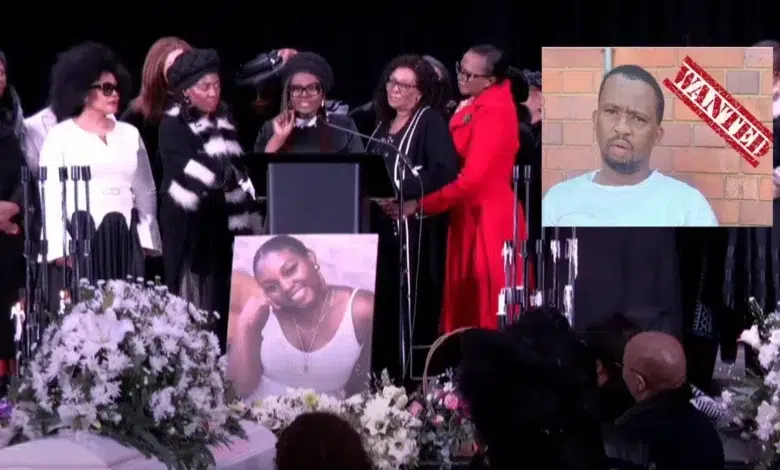Community Calls for Stronger Action as Arrest Warrants Issued in Olorato Mongale Murder Case

The brutal murder of Wits University postgraduate student Olorato Mongale has ignited widespread public outrage. There are renewed calls for decisive action against gender-based violence (GBV) and organised crime in South Africa. As police intensify the hunt for one remaining suspect, civil society groups, students, and community leaders are demanding accountability and urgent reforms.
ALSO READ: Police Intensify Investigation into Syndicate Behind Attack on Wits Student Olorato Mongale
Shock and Sorrow Following Mongale’s Murder
On 25 May 2025, police discovered Olorato Mongale’s body in Johannesburg, just hours after someone reported her missing. The 30-year-old student had been pursuing a Master’s degree in ICT Policy and Regulation at the University of the Witwatersrand (Wits).
She left her home with an unknown individual and was later found murdered — a tragic loss that stunned the academic community and the country.
The police quickly launched an investigation. According to official reports, they linked her murder to a broader criminal syndicate operating across multiple provinces. These provinces include Gauteng, KwaZulu-Natal, Limpopo, Mpumalanga, Free State, and North West.
Criminal Syndicate Under Scrutiny
Investigators believe the syndicate has targeted young women in public spaces such as shopping centres. They engage in crimes such as kidnapping, robbery, and murder. The SAPS confirmed the syndicate used a Volkswagen Polo, believed to be registered to the father of one of the suspects, to carry out these acts.
Police sources say Makhanya’s mother was also taken in for questioning. This occurred after she allegedly warned him about police activity — a move that may have helped him evade initial arrest.
Arrest Warrants and Escalating Tension
Philangenkosi Makhanya, identified as the prime suspect, died during a shootout with police in Amanzimtoti, KwaZulu-Natal, on 29 May. Police had attempted to arrest him when he allegedly opened fire.
Bongani Mthimkhulu, another suspect in the case, failed to appear in the Johannesburg Magistrate’s Court. As a result, SAPS issued an arrest warrant for him and have since increased operations to track him down.
Brigadier Athlenda Mathe, SAPS spokesperson, stated that the police had intensified their efforts to locate Mthimkhulu. They are deploying more officers and increasing checkpoints across Gauteng and surrounding areas.
CHECK OUT: SAPS Clears Fezile Ngubane in Kidnapping and Murder Case
Public Demands Swift Justice
The Wits University community has expressed deep frustration with the delays in the legal process. Students have called for stricter measures against criminals involved in GBV. They demand stronger protection for women on campus and in public spaces.
Speaking to media, student leaders at Wits urged the government to prioritise legislation and enforcement against syndicates. These are known to exploit vulnerable groups.
Gender rights organisations have echoed these concerns. Many argue that the state’s response to GBV remains reactive rather than preventative. The failure to detain all suspects swiftly has amplified concerns about systemic issues within the justice and policing system.
Case of Mistaken Identity Raises Broader Issues
Police initially arrested Fezile Ngubane in connection with the murder. However, investigators later confirmed that Ngubane was a victim of identity theft orchestrated by the syndicate. Authorities cleared him of all charges. Though the situation has raised concerns about due process and the risks faced by innocent individuals caught in complex criminal webs.
The Mongale family, who had previously supported efforts to rehabilitate Ngubane, withdrew their backing once police cleared him. They acknowledged the complicated nature of the syndicate’s tactics and emphasised the need for clear communication during investigations.
Ongoing Support and National Reflection
Wits University has increased counselling and trauma services to support grieving students and staff. The tragedy has served as a grim reminder of the challenges facing women in South Africa.
In response, civil society groups are pushing for:
- Faster prosecution of GBV and organised crime cases
- Better coordination between SAPS and local authorities
- Expanded public education campaigns on women’s safety
- Increased funding for victim support services
A Moment for Change
As SAPS continues the search for Bongani Mthimkhulu, the murder of Olorato Mongale remains a stark symbol of South Africa’s GBV crisis. Her story has captured national attention — not only because of the brutality of the crime, but also due to what it represents: the vulnerability many women face in public and private spaces.
The community is not only calling for justice in Mongale’s case, but for systemic reforms that prevent future tragedies. The calls grow louder each day that the remaining suspect remains at large.
Law enforcement now faces a critical test. They must bring all involved to justice and help restore public trust in the safety of South Africa’s streets and institutions.